Antonov An-124 Ruslan
| An-124 Ruslan | |
|---|---|
| | |
| An An-124 of 224th Flight Unit in Moscow, Russia in May 2010 | |
| Role | Transport aircraft |
| National origin | Soviet Union |
| Manufacturer | Antonov, Aviastar-SP |
| First flight | 24 December 1982[1] |
| Introduction | 1986 |
| Status | In service |
| Primary users | Russian Air Force Antonov Airlines Volga-Dnepr Airlines |
| Produced | 1982–2014 |
| Number built | 55[2] |
| Unit cost |
US$70–100 million[3] |
| Developed into | Antonov An-225 |
The Antonov An-124 Ruslan (Ukrainian: Антонов Ан-124 "Руслан") (NATO reporting name: Condor) is a strategic airlift jet aircraft. It was designed in the 1980s by the Antonov design bureau in the Ukrainian SSR, then part of the Soviet Union (USSR). Until the Boeing 747-8F, the An-124 was, for thirty years, the world's heaviest aircraft gross weight production cargo airplane and second heaviest operating cargo aircraft, behind the one-off Antonov An-225 (a greatly enlarged design based on the An-124).[4] The An-124 remains the largest military transport aircraft in the world.[6]
During development it was known as Izdeliye 400 (Product #400) in house, and An-40 in the West. First flown in 1982, civil certification was issued on 30 December 1992.[7] In July 2013, 26 An-124s were in commercial service with 10 on order.[8] In August 2014, it was reported that Antonov An-124 production was stopped due to the ongoing political tensions between Russia and Ukraine.[9] The various operators of the An-124 are in discussions with respect to the continuing airworthiness certification of the individual An-124 planes. The original designer of the An-124 is responsible for managing the certification process for its own products, but Russian/Ukrainian conflicts are making this process difficult to manage. Military operators are able to self-certify the airworthiness of their own aircraft, but Russian civil operators must find a credible outside authority for certification if Ukraine is unable to participate in the process.[10]
Development
During the 1970s, the Military Transport Aviation (Komandovaniye voyenno-transportnoy aviatsii or VTA) arm of the Soviet Air Forces had a shortfall in strategic heavy airlift capacity. Its largest planes consisted of about 50 Antonov An-22 turboprops, which were used heavily for tactical roles. A declassified 1975 CIA analysis concluded that the USSR did "...not match the US in ability to provide long-range heavy lift support."[11]
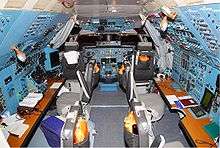
The An-124 was manufactured in parallel by two plants: the Russian company Aviastar-SP (ex. Ulyanovsk Aviation Industrial Complex) and by the Kyiv Aviation Plant AVIANT, in Ukraine. Design work started in 1971 and construction of facilities began in 1973. Manufacturing on the first airframe began in 1979.[12] Ultimately this project brought together over 100 factories contracted to produce systems and parts.
The first flight took place in December 1982 and the first exposure to the West followed in 1985 at the Paris Air Show.[13]
Russia and Ukraine agreed to resume the production in the third quarter of 2008.[14] In May 2008, a new variant—the An-124-150—was announced; it featured several improvements, including a maximum lift capacity of 150 tonnes.[15] However, in May 2009, Antonov's partner, the Russian United Aircraft Corporation announced it did not plan production of An-124s in the period 2009–2012.[16] In late 2009, Russian President Dmitry Medvedev ordered production of the aircraft resumed. It is expected that Russia will purchase 20 new aircraft.[17][18] In August 2014, Jane's reported that, Russian Deputy Minister of Industry and Trade Yuri Slusar announced that Antonov An-124 production was stopped due to ongoing political tensions between Russia and Ukraine.[9]
Design
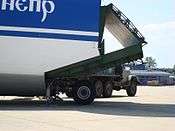

Externally, the An-124 is similar to the American Lockheed C-5 Galaxy, having a double fuselage to allow for a rear cargo door (on the lower fuselage) that can open in flight without affecting structural integrity.[19] It is slightly shorter, with a slightly greater wingspan, and a 25% larger payload. Instead of the Galaxy's T-tail, the An-124 uses a conventional empennage, similar in design to that of the Boeing 747.
The aircraft uses oleo strut suspension for its 24 wheels. The suspension has been calibrated to allow landing on rough terrain and is able to kneel to allow easier front loading.[19] The plane has an onboard overhead crane capable of lifting up to 30 tonnes of cargo, and items up to 120 tonnes can be winched on board.[20]
Up to 150 tonnes (150 long tons; 170 short tons) of cargo can be carried in a military An-124; it can also carry 88 passengers in an upper deck behind the wing centre section. The cargo compartment of An-124 is 36×6.4×4.4 m (118×21×14 ft), ca. 20% larger than the main cargo compartment of C-5 Galaxy, which is 36.91×5.79×4.09 m (121.1×19.0×13.4 ft). Due to limited pressurisation in the main cargo compartment (24.6 kPa, 3.57 psi),[21] it seldom carries paratroopers.[22]
Pilots have stated that the An-124 is light on the controls and easy to handle for an aircraft of its size.[23]
Some airports require pavement protection from the heat and blast effects of the An-124's auxiliary power unit.[24]
Operational history
Germany led the recent effort to lease An-124s for NATO strategic airlift requirements. Two aircraft are leased from SALIS GmbH as a stopgap until the Airbus A400M is available.[25] Under NATO SALIS programme NAMSA is chartering six An-124-100 transport aircraft. According to the contract An-124-100s of Antonov Airlines and Volga-Dnepr are used within the limits of NATO SALIS programme to transport cargo by requests of 18 countries: Belgium, Hungary, Greece, Denmark, Canada, Luxembourg, Netherlands, Norway, United Kingdom, Poland, Portugal, Slovakia, Slovenia, Finland, France, Germany, Czech Republic and Sweden. Two An-124-100s are constantly based on full-time charter in the Leipzig/Halle airport, but the contract specifies that if necessary, two more aircraft will be provided at six days' notice and another two at nine days' notice.[26] The aircraft proved extremely useful for NATO especially with ongoing operations in Iraq and Afghanistan.[27]
_is_carefully_loaded_onto_a_Russian-built_An-124_Condor_(Antonov).jpg)
United Launch Alliance (ULA) contracts the An-124 to transport the Atlas V launch vehicle from its facilities in Decatur, Alabama to Cape Canaveral. ULA also uses the An-124 to transport the Atlas V launch vehicle and Centaur upper stage from their manufacturing facility in Denver, Colorado to Cape Canaveral and Vandenberg Air Force Base.[28] Two flights are required to transfer each launch vehicle (one for the Atlas V main booster stage and another for the Centaur upper stage).[29] It is also contracted by Space Systems Loral to transport satellites from Palo Alto, CA to the Arianespace spaceport in Kourou, French Guiana.[30]
Airbus Transport International, a subsidiary of Airbus, has selected another Russian cargo company, Polet Airlines as "designated carrier" to the company. Polet expects its three An-124-100s will transport astronautic equipment manufactured by EADS, which is Airbus' parent company, and components of the Airbus A380 superjumbo.[31]
As of 2013 the An-124 has visited 768 airports in over 100 countries.[32]
Significant activities
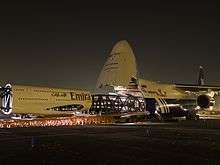
- On May 1987, an An-124 set a world record, covering the distance of 20,151 km (10,881 nmi) without refuelling.[33] The flight took 25 hours and 30 minutes; the takeoff weight was 455,000 kg.
- In July 1985, an An-124 carried 171,219 kg (377,473 lb) of cargo to an altitude of 2,000 m (6,600 ft) and 170,000 kg to an altitude of 10,750 m (35,270 ft).[34]
- An An-124 was used to transport the Obelisk of Axum back to its native homeland of Ethiopia from Rome in April 2005.[35]
- An An-124 was used to transport an EP-3E Aries II electronic intelligence aircraft from Hainan Island, China on 4 July 2001 following the Hainan Island incident.
- In July 2010, an An-124 was used to transport four 35-foot and three 21-foot skimmer boats from France to the US to assist with the clean-up of the Deepwater Horizon oil spill[36]
- An An-124 was used in April 2011 to airlift a large Putzmeister concrete pump from Germany to Japan to help cool reactors damaged in the Fukushima nuclear accident.[37] The An-225 was used to transport an even larger Putzmeister concrete pump to Japan from the United States.[38]
Variants


- An-124 Ruslan
- Strategic heavy airlift transport aircraft
- An-124-100
- Commercial transport aircraft
- An-124-100M-150
- Commercial transport version fitted with Western avionics
- An-124-102
- Commercial transport version with an EFIS flight deck
- An-124-115M
- Planned new variant with EFIS based on Rockwell Collins avionic parts
- An-124-130
- Proposed version
- An-124-135
- Variant with one seat in the rear and the rest of the cargo area (approx. 1,800 square feet) dedicated to freight
- An-124-150
- New variant with increased payload (150 tonnes)
- An-124-200
- Proposed version with General Electric CF6-80C2 engines, each rated at 59,200 lbf (263 kN)
- An-124-210
- Joint proposal with Air Foyle to meet UK's Short Term Strategic Airlifter (STSA) requirement, with Rolls-Royce RB211-524H-T engines, each rated 60,600 lbf (264 kN) and Honeywell avionics—STSA competition abandoned in August 1999, reinstated, and won by the Boeing C-17A.
- An-124-300
- variant ordered by the Russian Air Force with new avionics, a new improved braking system and a payload of 150 tonnes.[39]
Operators

Military
- Russian Air Force (14 + more in reserve.[40] By 2020 it is planned total to upgrade 20 aircraft in the version of An-124-100M, including aircraft in storage. As of December 2014 the Russian Armed Forces Air Force received a total of 9 aircraft, which JSC " Aviastar-SP" in Ulyanovsk has upgraded.[41][42][43])
- Military Transport Aviation
- 12th Military Transport Air Division – Tver (Migalovo);
- 566th Military Transport Air Regiment – Seshcha, Bryansk Oblast – Il-76, An-124;[44]
- 224th Air Detachment of Military Transport Aviation – Tver – An-124-100, Il-76MD;
- 12th Military Transport Air Division – Tver (Migalovo);
- Military Transport Aviation
Former military operators
Civil
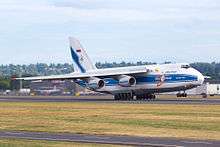

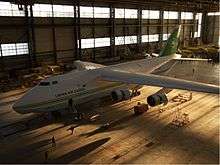
In July 2013, 26 An-124s were in commercial service.[8]
- Libyan Arab Air Cargo (2,[8] grounded since Libyan Civil War).[45]
- Volga-Dnepr (10, with 5 on order)[8]
Former civil operators
- Aeroflot Russian International Airlines - retired from fleet in 2000
- Ayaks Cargo (Ayaks Polet Airlines)
- Polet Airlines - ceased operations 2014
- Rossiya Airlines - retired from fleet
- Transaero Airlines - retired from fleet
- Aeroflot Soviet Airlines - transferred to Aeroflot Russian fleet
- Air Foyle (in partnership with Antonov Design Bureau) – joint venture dissolved 2006
- HeavyLift Cargo Airlines (in partnership with Volga-Dnepr Airlines) - ceased operations 2006
- Antonov AirTrack - ceased operations
- Titan Cargo – company ceased operations 2002
- TransCharter Titan Cargo - ceased operations 2003
Notable accidents
As of November 2016, four An-124 hull-loss accidents have been recorded, with a total of 97 fatalities:[46]
- On 13 October 1992, SSSR-82002, operated by Antonov Airlines crashed near Kiev, Ukraine during flight testing, suffering nose cargo door failure during high-speed descent (part of test program) resulting in total loss of control. Airframe came down in forest near Kiev, killing eight of nine crew.[47]
- On 15 November 1993, RA-82071, operated by Aviastar Airlines crashed into a mountain at 11,000 feet (3,400 m) while in a holding pattern at Kerman, Iran. 17 fatalities.[48]
- On 8 October 1996, RA-82069, owned by Aeroflot but operated by Ayaks Cargo, crashed at San Francesco al Campo, Italy, while initiating a go-around after a low visibility approach on Turin Caselle airport's runway 36. 4 fatalities.[49]
- On 6 December 1997, RA-82005, operated by the Russian Air Force, crashed in a residential area after take-off in Irkutsk, Russia. All 23 people on board and 44 people on the ground were killed.[50]
Specifications (An-124-100M-150)

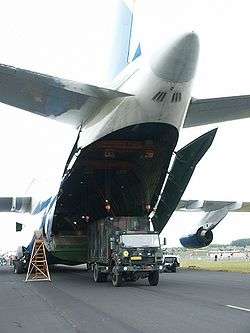
Data from Antonov[5]
General characteristics
- Crew: 4–6 (pilot, copilot, navigator, senior flight engineer (+flight engineer, radio man) + 2 loadmasters)
- Capacity: 88 passengers or the hold can take an additional 350 on a palletised seating system
- Payload: 150,000 kg (330,000 lb)
- Length: 68.96 m (226 ft 3 in)
- Wingspan: 73.3 m (240 ft 5 in)
- Height: 20.78 m (68 ft 2 in)
- Wing area: 628 m² (6,760 sq ft)
- Empty weight: 175,000 kg (385,000 lb)
- Useful load: 230,000 kg (508,000 lb)
- Loaded weight: 405,000 kg (893,000 lb)
- Max. takeoff weight: 405,000 kg (893,000 lb)
- Powerplant: 4 × Progress D-18T turbofans, 229.5 kN (51,600 lbf) each
Performance
- Maximum speed: 865 km/h (467 kn (537 mph))
- Cruise speed: 800–850 km/h (430 kn (490 mph))
- Range: 5,200 km (2,808 nm, 3231 mi)
- Service ceiling: 12,000 m (39,370 ft)
- Wing loading: 645 kg/m² (74.7 lb/sq ft)
- Thrust/weight: 0.23
- Take-off run distance (maximum take-off weight): 2,520 m (8,270 ft)
- Landing roll distance at maximum landing weight: 900 m (3,000 ft)
Flight range
- An-124-100
- 0 tons of cargo= 15,000 km (8,100 nmi)[51]
- 10 tons of cargo= 14,100 km (7,613 nmi)
- 20 tons of cargo= 13,250 km (7,154 nmi)
- 30 tons of cargo= 12,300 km (6,641 nmi)
- 40 tons of cargo= 11,500 km (6,210 nmi)
- 72 tons of cargo= 8,700 km (4,698 nmi)
- 90 tons of cargo= 7,100 km (3,834 nmi)
- 97 tons of cargo= 6,500 km (3,510 nmi)
- 104 tons of cargo= 5,900 km (3,186 nmi)
- 108 tons of cargo= 5,550 km (2,997 nmi)
- 120 tons of cargo= 4,500 km (2,430 nmi)
- Аn-124-100М-150
- 40 tons of cargo= 11,900 km (6,425 nmi)
- 92 tons of cargo= 7,500 km (4,050 nmi)
- 113 tons of cargo= 5,900 km (3,186 nmi)
- 120 tons of cargo= 5,400 km (2,916 nmi)
- 122 tons of cargo= 5,200 km (2,808 nmi)
- 150 tons of cargo= 3,200 km (1,728 nmi)
Notable appearances in media
See also
- Related development
- Aircraft of comparable role, configuration and era
References
- ↑ "Era of Ruslan: 25 years" (Press release). Antonov. 24 December 2007. Archived from the original on 19 March 2008. Retrieved 25 February 2008.
- ↑ "An-124 Production List". russianplanes.net (in Russian). Retrieved 21 May 2014.
- ↑ Archived 11 January 2009 at the Wayback Machine.
- ↑ Though the as planned An-124-100M-150 enlarged version has a 7% higher payload than the operational Boeing 747-8F. The 747-8F has over two times the range (5,050 mi or 8,130 km) with a payload of 295,800 lb (134,000 kg) than the An-124-100M-150 with the same payload. The An-124-100M-150 is to carry less than half the payload at the same range.[5]
- 1 2 "AN-124-100 Performance". Antonov. Retrieved 10 August 2013.
- ↑ Nikolai, Novichkov (2 December 2014). "Russia completes initial An-124 upgrade programme". janes.com. Archived from the original on 19 October 2015. Retrieved 5 July 2015.
- ↑ E. Gordon, Antonov's Heavy Transports, Midland Publishing.
- 1 2 3 4 5 6 "World Airliner Census". Flight International, 16–22 August 2013
- 1 2 UPDATE: Time called on An-124 production re-start IHS Jane's Defence Industry. Retrieved 5 May 2015.
- ↑ "The Tragic Fate of Ukraine's Antonov, Once a Legendary Name in Aeronautics". Sputnik. 16 September 2016. Retrieved 28 November 2016.
- ↑ Trends in Soviet Military Programs Archived 31 May 2012 at the Wayback Machine. (October 1976) (originally Top Secret), Central Intelligence Agency.
- ↑ Era of Ruslan: 25 years. Antonov, Accessed: 6 November 2011.
- ↑ The Condor: A New Soviet Heavy Transport Archived 31 May 2012 at the Wayback Machine. (originally classified Secret), 1986, Central Intelligence Agency.
- ↑ "Ukraine, Russia to resume production of giant cargo planes". Forbes. Kiev. Thomson Financial. 28 April 2008. Archived from the original on 30 August 2008. Retrieved 28 April 2008.
- ↑ Taverna, Michael A. "Russia, Ukraine Near Deal On Relaunch of Modernized An-124". Berlin: Aviation Week. Archived from the original on 21 May 2011. Retrieved 16 August 2008.
- ↑ Kingsley-Jones, Max (7 May 2009). "Superjet the biggest casualty as Russia slashes airliner output plans". Flightglobal. Archived from the original on 10 May 2009. Retrieved 9 May 2009.
- ↑ Maternovsky, Dennis (2009). "Russia to Resume Making World’s Largest Plane, Kommersant Says". Bloomberg.com. 24 December 2009. Accessed 28 Dec 2009.
- ↑ http://www.ruaviation.com/docs/3/2011/3/18/26/print/
- 1 2 "Archived copy". Archived from the original on 7 February 2015. Retrieved 6 February 2015.
- ↑ An124-100 technical specification Ruslan International. Retrieved: 24 July 2010.
- ↑ Antonov's Heavy Transports. Midland Publishing
- ↑ Phillips, CPT W. Scott (31 August 1999). "Fixed-Wing Aircraft". Federation of American Scientists Military Analysis Network.
- ↑ "AVIATION Reports – 2000 – A00O0279". Transportation Safety Board of Canada, 31 July 2008. Retrieved 24 April 2012. Quote: "The AN124 has been described by training personnel and pilots as being very easy to handle for an aircraft of its size. The AN124 tends to be very light on the controls."
- ↑ Nielsen, Erik. "Copenhagen Airport, Use of auxiliary power unit (APU)". Copenhagen Airport / Boeing. p. 6.5. Archived from the original on 9 May 2013. Retrieved 22 January 2013.
- ↑ "Strategic airlift agreement enters into force". NATO Update. 23 March 2006.
- ↑ Strategic Airlift Interim Solution (SALIS) Archived 9 May 2009 at the Wayback Machine.
- ↑ Antonov An-124 NATO SALIS Program Extended Through End of 2010. deagel.com
- ↑ Lockheed Martin Atlas rocket on The History Channel.
- ↑ Lockheed Martin Delivers Atlas V to Cape Canaveral for NASA's Mars Reconnaissance Orbiter Mission. Ilslaunch, 4 April 2005.
- ↑ Space Systems/Loral Delivers World'S Largest Satellite To Launch Base
- ↑ "Airbus Taps Russian Carrier". Kommersant. 25 November 2005.
- ↑ "30 years since the AN-124 Ruslan maiden take-of". Antonov.com. Retrieved 21 June 2013.
- ↑ Оружие России; Ан-124 "Руслан" (Condor), дальний тяжелый военно-транспортный самолет Archived 3 June 2009 at the Wayback Machine.
- ↑ Аэрокосмическое общество Украины; Международная авиационная федерация зарегистрировала 124 мировых рекорда, установленных на самолёте Ан-225 Archived 20 February 2012 at the Wayback Machine.
- ↑ BBC News; Obelisk arrives back in Ethiopia
- ↑ "Archived copy". Archived from the original on 7 April 2014. Retrieved 2 April 2014.
- ↑ Germany sends giant pump to help cool Fukushima reactor
- ↑ SRS pump will head to Japan
- ↑ "Russian Air Force Gets First Modernized An-124s". RIA Novosti. 17 May 2012. Retrieved 21 June 2013.
- ↑ bmpd (12 April 2013). "bmpd - Самолет Ан-124: история, настоящее, перспективы" [AN-124: History, Present and Prospects] (in Russian). Bmpd.livejournal.com. Archived from the original on 9 February 2016. Retrieved 12 April 2013.
- ↑ http://armstrade.org/includes/periodics/news/2014/1124/135026738/detail.shtml
- ↑ http://www.thaindian.com/newsportal/world-news/russian-air-force-gets-first-modernized-an-124s_100618564.html
- ↑ bmpd (9 May 2013). "Петр Бутовски об Ан-124 "Руслан"" [Peter Butovskaya of AN-124 "Ruslan"] (in Russian). Bmpd.livejournal.com. Archived from the original on 16 November 2013. Retrieved 9 May 2013.
- ↑ see also http://www.ww2.dk/new/air%20force/regiment/tap/566vtap.htm and ru:Сеща (аэродром)
- ↑ "Libyan Arab Air Cargo (ATDB)". Aerotransport.org. Retrieved 2014-03-03.
- ↑ "ASN Aviation Safety Database: Antonov 124-100". Aviation Safety Network. Retrieved 28 November 2016.
- ↑ "Accident Description, Anotonov 124-100, Tuesday 13 October 1992". Aviation Safety Network. Retrieved 14 August 2008.
- ↑ "Accident Description, Antonov 124-100, Monday 15 November 1993". Aviation Safety Network. Retrieved 14 August 2008.
- ↑ "Accident Description, Antonov 124-100, Tuesday 8 October 1996". Aviation Safety Network. Retrieved 22 April 2008.
- ↑ Velovich, Alexander (17 December 1997). "Multiple engine failure blamed for An-124 Irkutsk accident". Moscow: Flightglobal. Retrieved 2 December 2010.
- ↑ "An-124 virtual loading at Volga-Dnepr". Archived from the original on 30 April 2008.
Further reading
- Yeltsov, Gennady (2011). Antonov AN-124: A Tale of Air Supremacy. JustplanesUK. ISBN 978-0956932808.
External links
| Wikimedia Commons has media related to Antonov An-124. |
|
|